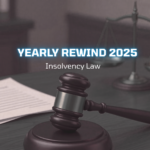Leasehold right: An intangible asset

Introduction
The primary object of the Insolvency and Bankruptcy Code, 2016 (Code) is the revival of the corporate debtor undergoing insolvency process and to keep it running as a going concern. To achieve this objective, the Code prescribes the imposition of a moratorium upon initiation of corporate insolvency resolution process and casts a duty on the resolution professional to make every attempt to protect and preserve the value of the assets of the corporate debtor and manage the operations of the corporate debtor as a going concern. In doing so, the resolution professional is required to take control and custody of any asset over which the corporate debtor has ownership rights.
In furtherance of achieving this objective, the National Company Law Appellate Tribunal (NCLAT) in New Okhla Industrial Development Authority v. Amit Agarwal (NOIDA Judgement), has held that ‘leasehold rights’ conferred on the corporate debtor under a lease are an ‘asset’ of the corporate debtor, and the resolution professional can take control of such asset to run the corporate debtor as a going concern.
Facts
New Okhla Industrial Development Authority (NOIDA) is the owner of the leasehold plot in question which it had leased to Boulevard Projects Pvt. Ltd. (Boulevard). Insolvency proceedings were initiated against Boulevard and the resolution professional took control over the leased plot.
NOIDA filed an application before the National Company Law Tribunal (NCLT) seeking the removal of the leasehold plot from the pool of assets of Boulevard. NOIDA argued that the resolution professional had illegally taken custody and control of the leased plot as the leased plot did not belong to Boulevard but rather to NOIDA, and the insolvency professional can only take control and custody of an asset over which the corporate debtor i.e., Boulevard has ownership rights. It was further contended that under the Code, the resolution professional cannot take into his custody any third-party assets which are in the possession of the corporate debtor and are only held under trust or under contractual arrangements. However, the NCLT disagreed with NOIDA and dismissed its application. Consequently, NOIDA challenged NCLT’s order before the NCLAT.
NCLAT’s ruling
The primary issue before the NCLAT was whether the ‘leasehold rights’ vested in a corporate debtor must be considered as an ‘asset’ of Boulevard within the meaning of the Code. The NCLAT noted that under the Code, the resolution professional is required to take custody and control of any asset over which the corporate debtor has ownership rights as recorded in the balance sheet of the corporate debtor including ‘intangible assets’[i]. The NCLAT noted that ‘intangible asset’ is defined under the Income Tax Act, 1961[ii] as know-how, patents, copyrights, trademarks, licenses, franchisees or any other business or commercial rights of similar nature. The NCLAT ruled that the words ‘any other business or commercial rights of similar nature’ would include leasehold rights which have ‘commercial nature’. The NCLAT also relied upon the Indian Accounting Standard which defines an intangible asset as an identifiable non-monetary asset, without physical substance, held for use in the production or supply of goods or services, for rental to others, or for administrative purposes. NCLAT found that leasehold rights satisfy all three criteria to meet the definition of an intangible asset, i.e., identifiability, control over the resource by the enterprises and expectation of future economic benefits to the enterprise.
Therefore, NCLAT held that intangible assets would include leasehold rights accrued to Boulevard and the resolution professional is empowered under the Code to take control and custody of the leased plot. However, the NCLAT clarified that the assets are only limited to ‘leasehold rights’ and not the ‘leased plot’ itself, which continues to belong to NOIDA. Taking further note that Boulevard had incurred a substantial expense to develop the leased plot, NOIDA itself has never sought termination of the lease deed, and that a resolution plan has been approved by the committee of creditors of Boulevard, the NCLAT disposed of the appeal.
Our thoughts
The NOIDA Judgement upholds the objective of the moratorium under the Code which seeks to ensure that there is no depletion of a corporate debtor’s assets during the insolvency resolution process. The reason being that the corporate debtor is given a chance to function as a going concern during the moratorium, thus attempting to maximise value for all stakeholders. It should be noted that in order to prevent the improper removal of an asset from the debtor’s estate, courts in India have also time and again held that a third party may not be allowed to terminate a contract with a corporate debtor on the ground of insolvency, if such contract is important for the sustenance and successful resolution of the corporate debtor, and its termination will hasten the death of the corporate debtor.[iii] Therefore, in a conflict between contractual right to terminate and the objective of corporate rescue, the courts have prioritised the ‘going-concern’ nature of the corporate debtor, in line with the objective of the Code.
Author: Souvik Ganguly
The information contained in this document is not legal advice or legal opinion. The contents recorded in the said document are for informational purposes only and should not be used for commercial purposes. Acuity Law LLP disclaims all liability to any person for any loss or damage caused by errors or omissions, whether arising from negligence, accident, or any other cause.
[i] Section 18(f)(iv) of the Code
[ii] Explanation 3 to Section 32(1) of the Income Tax Act, 1961
[iii] Gujarat Urja Vikas Nigam Limited v. Mr. Amit Gupta; TATA Consultancy Services Ltd. v. Vishal Ghisulal Jain, Resolution Professional, SK Wheels Pvt. Ltd.



